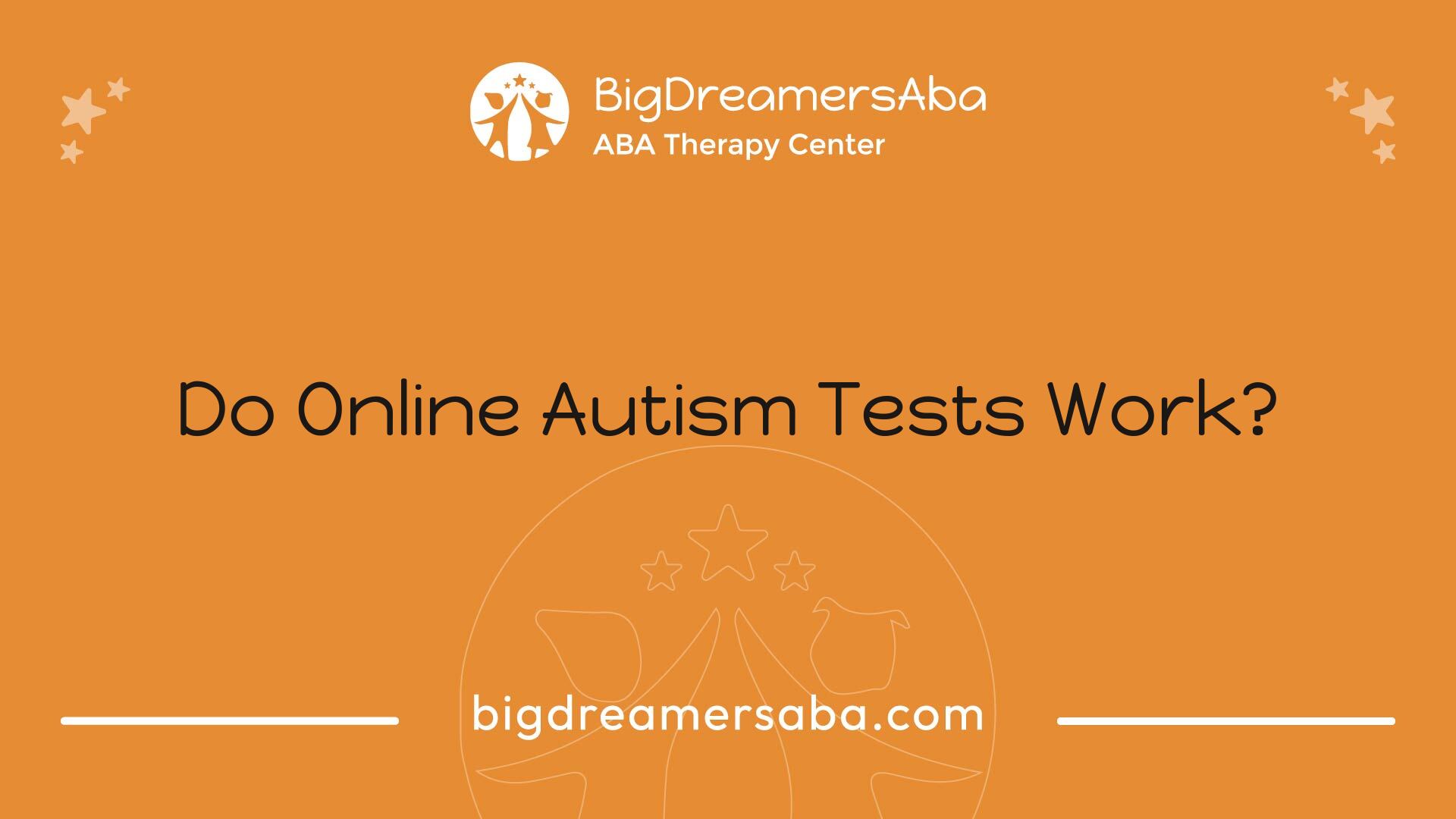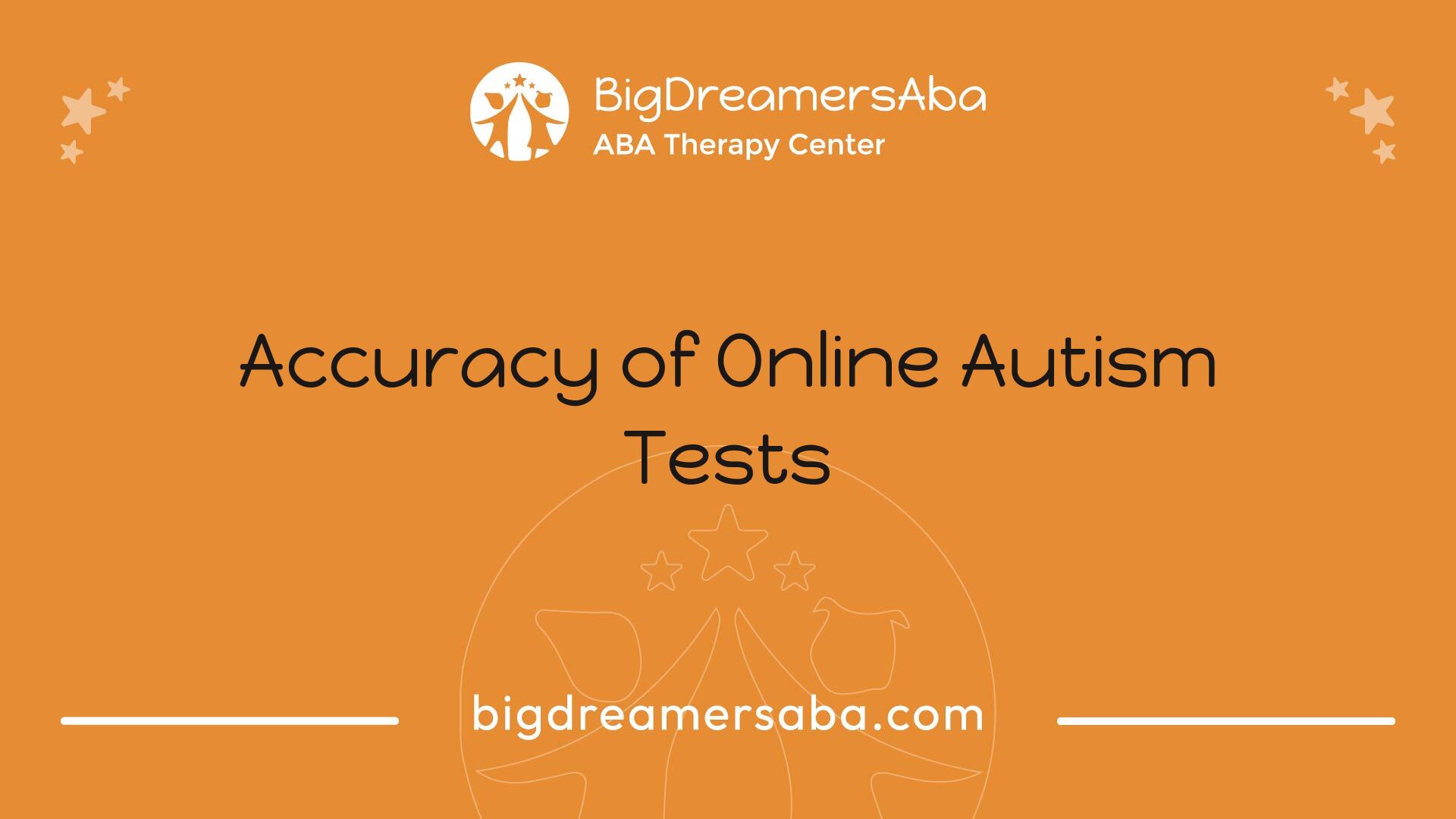Do Online Autism Tests Work?
Wondering if online autism tests are accurate? Discover the truth behind their effectiveness and limitations.


Understanding Online Autism Tests
Purpose of Online Tests
Online autism tests are designed as preliminary screening tools that help individuals or parents/guardians identify potential signs or risk factors associated with autism spectrum disorder (ASD). These tests serve as initial assessments that can highlight traits commonly linked to autism, encouraging users to seek professional evaluations for a conclusive diagnosis.
Typically, these online assessments consist of 50 questions or fewer and can be completed in just a few minutes. The results usually yield a score that indicates the likelihood of autism traits, but they are not intended for diagnostic purposes. It is crucial for users to understand that while these tests can suggest characteristics of autism, they cannot confirm a diagnosis.
Limitations of Online Tests
Numerous limitations affect the accuracy of online autism screening tests. Key factors influencing the reliability of results include:
Limiting FactorDescriptionLack of Professional InteractionThe absence of trained professionals means that assessments may miss critical nuances of an individual's behavior or symptoms.Self-Reported InformationOnline tests primarily rely on the user's self-reported data, which may not provide a full picture of behavioral patterns.Variations in Test QualityThe validity and reliability of the tests can vary significantly, leading to inconsistent outcomes.
Due to these limitations, it is essential to view online autism tests as a starting point rather than definitive diagnostic methods. For an accurate assessment and access to specific programs and services, following up with a professional evaluation is necessary [3].
In conclusion, while online autism tests offer a convenient way for individuals to assess possible autism traits, relying solely on these tests without professional input can lead to incomplete or inaccurate evaluations.
Accuracy of Online Autism Tests

Exploring the accuracy of online autism tests is essential for understanding their effectiveness as preliminary screening tools. This section will provide insights into research findings and compare online assessments with traditional in-person evaluations.
Research Findings
Research indicates that the accuracy of online autism tests can vary significantly. A meta-analysis focusing on level 1 autism screening tests reported a pooled sensitivity of 0.72 and a pooled specificity of 0.98 for detecting autism in children aged 14–26 months [4]. These findings suggest that while online tests can effectively detect a majority of autism cases, there is still a notable proportion of missed diagnoses.
Further studies have supported these findings, revealing that while some online screening tools show relatively high accuracy rates, others perform poorly. A study published in the Journal of Autism and Developmental Disorders found that online tests were less accurate compared to in-person evaluations conducted by professionals, emphasizing the need for clinical judgment and a multidisciplinary approach for an accurate autism diagnosis.
Study TypeSensitivitySpecificityMeta-Analysis0.720.98Online Tests vs. In-PersonVariesVariesTelehealth Methods (videoconferencing)75%-100%68.75%-100%
Comparison with In-Person Evaluation
When comparing online autism tests to in-person evaluations, it's crucial to consider the capabilities of each approach. While online assessments can serve as convenient, preliminary screening options, they have limitations. In-person evaluations involve comprehensive assessments performed by trained professionals, which ensure a more thorough analysis of behavior and development.
Research indicates that telehealth methods, such as videoconferencing, can achieve an accuracy rate of 80-91% in comparison to traditional in-person diagnostic methods. This suggests that while telehealth evaluations can serve as a viable alternative when in-person assessments are not possible, they still may not fully replace the depth of in-person clinical assessments.
Overall, online autism tests are valuable as a starting point for individuals seeking to understand autism better but should not be relied upon as the sole means of diagnosis. For more accurate assessment and diagnosis, professional evaluations remain the gold standard in identifying autism spectrum disorder (ASD).
Professional Diagnostic Assessments

Accurate diagnosis of autism requires the expertise of licensed professionals who utilize a variety of tools and assessments. This section discusses their vital role and the diagnostic tools commonly employed.
Role of Licensed Professionals
Licensed professionals, including psychologists and developmental pediatricians, are essential in the evaluation and diagnosis of autism. They conduct comprehensive evaluations that include in-depth interviews, direct observations, and standardized assessments, which are crucial for providing accurate diagnoses and tailored treatment plans.
These professionals look at various aspects of a person's behavior and development, ensuring a holistic view when considering potential autism symptoms. Their expertise helps differentiate between autism and other conditions, leading to a more precise understanding of a person's needs.
Diagnostic Tools for Autism
Several standardized tools are utilized in the assessment of autism. These tools help professionals gather essential information and ensure the accuracy of the diagnosis.
Diagnostic ToolDescriptionKey DomainsAutism Diagnostic Interview-Revised (ADI-R)A structured interview covering developmental history and behavioral issues.Social interaction, Communication, Restricted and repetitive behaviorsAutism Diagnostic Observation Schedule (ADOS)A standardized observational tool assessing various social and communication skills.Social interaction, Communication, Behavioral responsesChildhood Autism Rating Scale (CARS)A behavior rating scale providing a quantitative measure of autistic traits using direct observation and caregiver input.Social interaction, Communication, Behavioral patternsGilliam Autism Rating Scale (GARS)An assessment tool consisting of three subscales designed to screen for autism spectrum disorders.Stereotyped behaviors, Communication, Social interaction
These tools, when used in conjunction with professional expertise, provide a comprehensive approach to understanding autism and facilitating early and effective intervention. For those seeking further information on related topics, consider exploring autism vs. ADHD or maternal obesity and autism's connection.
Factors Affecting Test Results
When examining the accuracy of online autism screening tools, several factors come into play that can significantly impact the test results. This section will explore the test source and design, as well as the administration and validity of these assessments.
Test Source and Design
Online autism tests are mainly self-administered questionnaires created to provide an initial screening for autism spectrum disorder (ASD). These tests are typically filled out by individuals or parents/guardians who notice signs of autism [1]. The design and source of these tests can vary greatly, influencing their reliability and the insights they offer.
Well-designed assessments will include clear, specific questions that target known symptoms of autism. Some tests may be backed by research and developed by professionals in the field, while others might be created by less credible sources. A table showcasing common features of these tests can help identify their effectiveness.
Test Design FactorsDescriptionQuestion ClarityTests should have clear and concise questions that accurately reflect symptoms of autism.Research BackingTests supported by scientific research are typically more reliable.Professional DevelopmentAssessments crafted by licensed professionals are likely to yield better insights.
Administration and Validity
The manner in which online autism tests are administered can impact their accuracy. Self-completed online questionnaires may introduce bias, as individuals may misunderstand questions or interpret symptoms differently. Therefore, the validity of the results hinges not only on the design but also on how comprehensively the test is administered.
Validity refers to whether a test truly measures what it claims to measure. In this context, it reflects how well an online test can accurately identify signs of autism. Studies evaluating online autism screening tests have reported mixed levels of accuracy. Some indicate relatively high accuracy rates, while others suggest lower efficacy. Although online tests serve as useful preliminary screening tools, they should not replace professional evaluations, which involve interviews, direct observations, and standardized assessments.
This underscores the importance of seeking professional evaluation and guidance from qualified healthcare providers specializing in autism assessment. These professionals provide essential insights for intervention and support, ensuring that individuals with autism receive the necessary assistance tailored to their needs.
Importance of Early Detection
AAP Recommendations
The American Academy of Pediatrics (AAP) emphasizes the importance of early detection of autism spectrum disorder (ASD). They recommend that all children be screened specifically for autism at ages 18–24 months. Research indicates that early intervention, particularly before the age of three, yields the most significant positive effects. Although screening facilitates earlier referrals and diagnoses, it is noteworthy that the median age of diagnosis in the US remains around 4.5 years old [4].
Age of ScreeningRecommendation18–24 monthsUniversal screening for autismBefore 3 yearsImplementation of intervention
Impact of Early Intervention
The benefits of early intervention for children diagnosed with autism cannot be overstated. Strategies such as Early Intensive Behavioral Interventions, including Applied Behavior Analysis (ABA), have shown to help children with ASD acquire critical skills and improve their long-term outcomes [4]. Early intervention programs can enhance communication, social skills, and adaptive behavior.
Research has established that therapies targeting early developmental milestones can markedly increase the likelihood of positive developmental trajectories. For instance, speech therapy is effective in improving spoken language abilities and can introduce alternative communication methods such as sign language or technology-assisted communication tools.
In summary, the significance of early detection and intervention in children with autism is supported by robust clinical evidence. Parents and caregivers should remain vigilant about the developmental milestones of children and consider professional evaluations if there are concerns about possible autism. For further exploration of autism interfacing with various factors, you might find interest in aspects like autism vs. ADHD or maternal obesity and autism's connection.
Considerations for Seeking Evaluation
Telehealth Methods
Telehealth methods have emerged as a significant alternative to traditional in-person assessments for autism spectrum disorder (ASD). According to recent studies, these methods demonstrate high levels of accuracy, reported to be between 80-91% when compared to conventional diagnoses [5]. The use of videoconferencing or store-and-forward methods allows clinicians to interact with patients remotely, providing flexibility and accessibility to families seeking evaluation.
The accuracy of telehealth assessments can be broken down into sensitivity and specificity values:
MetricValue RangeSensitivity75% - 100%Specificity68.75% - 100%
These statistics highlight that telehealth evaluations can effectively identify individuals who may have autism while also minimizing false positives. Caregivers and clinicians have reported overall satisfaction with these methods, pointing towards their efficacy as reliable diagnostic tools for ASD.
Reliability of Online Assessments
While convenience is a hallmark of online assessments, questions about their accuracy persist. Online tests can offer initial insights but lack the comprehensive evaluation that licensed professionals provide. It is essential to consider the sources and design of these online assessments, as their validity can vary significantly.
Many online assessments lack a standardized approach and may not be scientifically validated, leading to concerns about results being misleading. Although some online tests may claim high accuracy, their findings should not replace professional evaluation. Decisions based on online assessments should be approached with caution.
To ensure a more accurate understanding of a child's needs, families are encouraged to follow up positive online test results with a formal assessment conducted by a licensed professional. For more information on professional evaluations, consult resources that delve into the diagnostic tools used for autism. Seeking evaluation through telehealth methods can provide a valuable option for families, particularly if access to in-person services is limited.
Recent articles

How ABA Therapy Supports Children in Managing Stress and Anxiety

How to Encourage Independence in Children Receiving ABA Therapy
